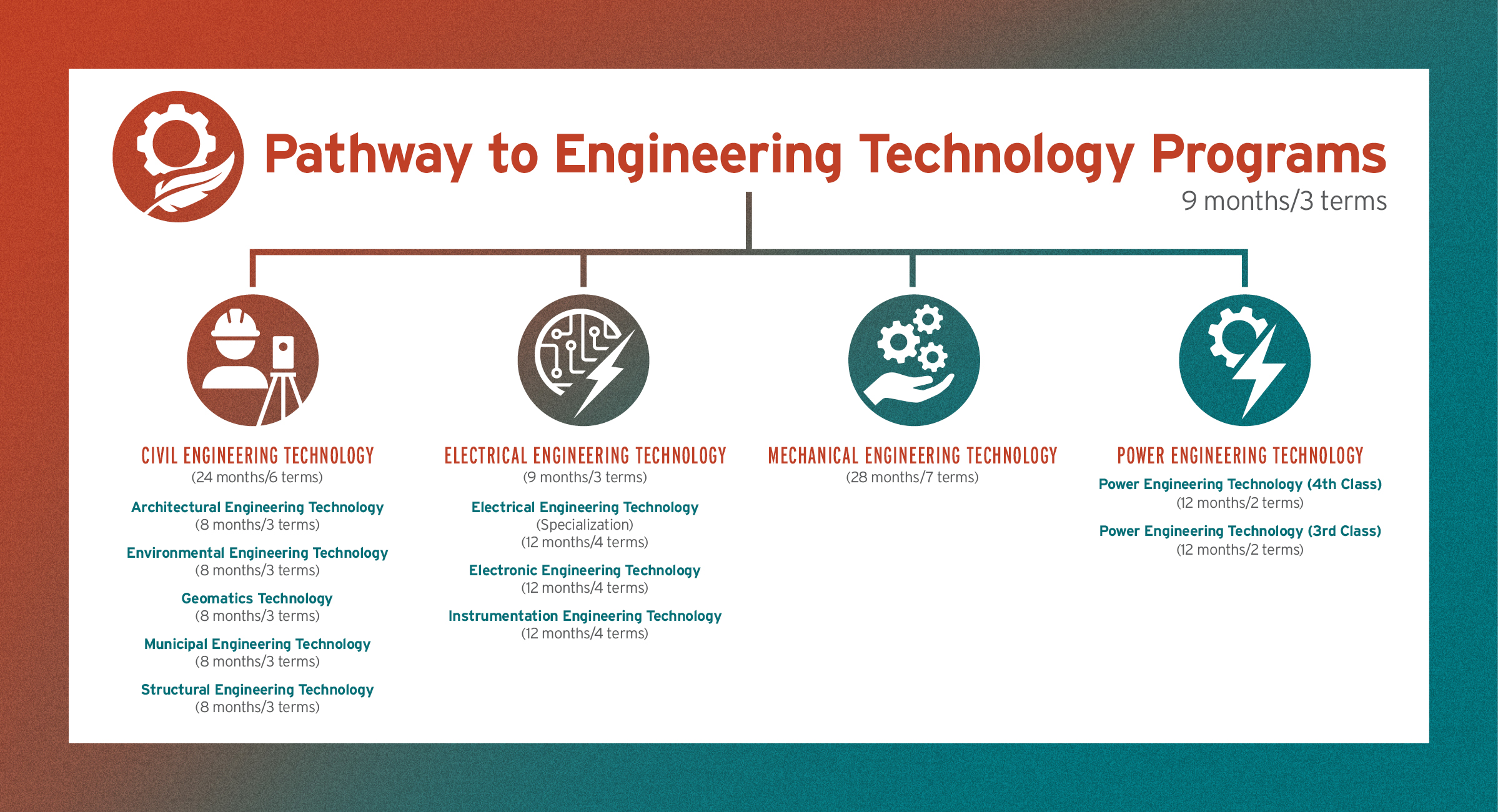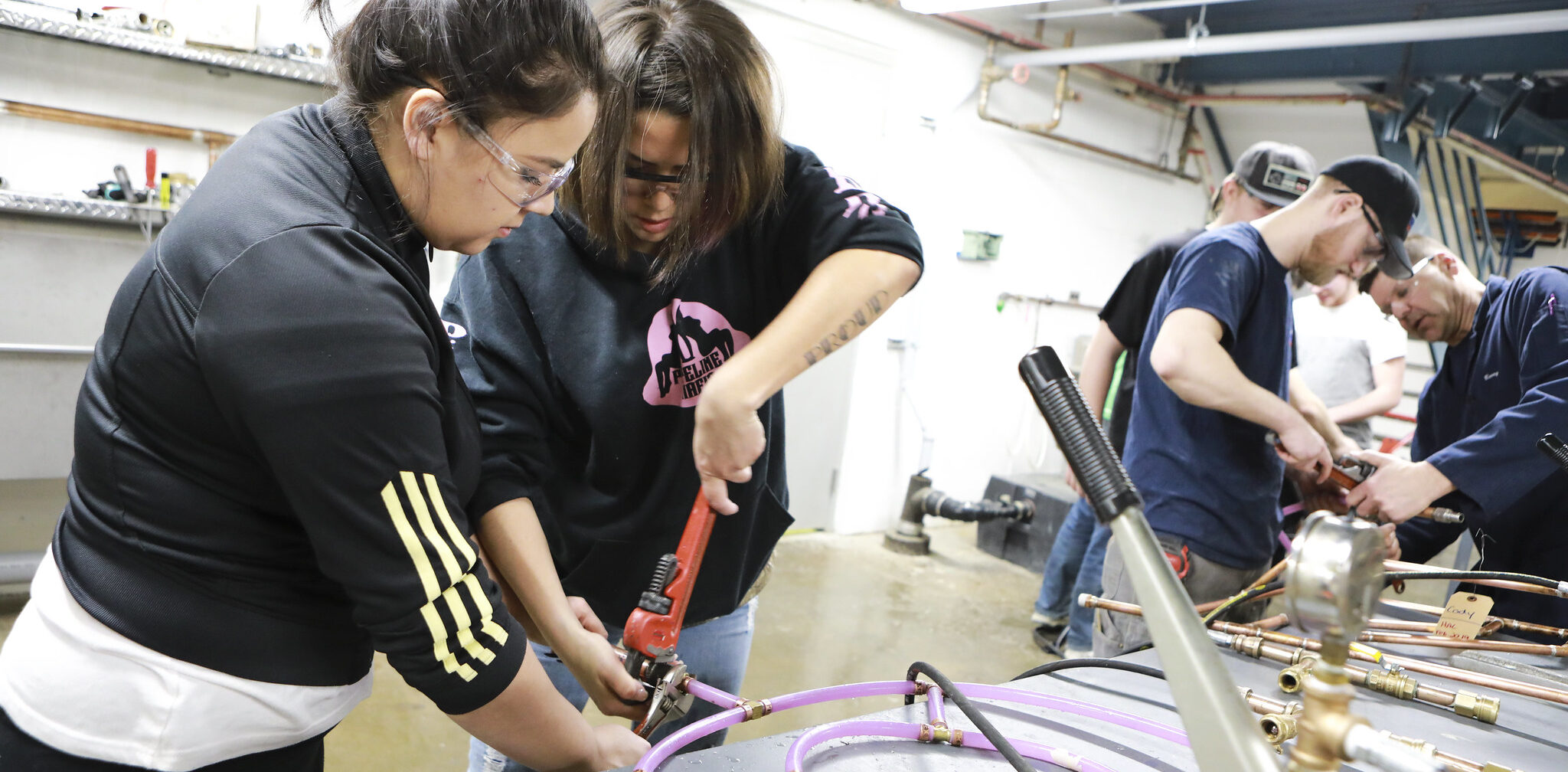Pathway to Engineering Technology Programs: A Rundown
Did you know that you can start a career in engineering at any level?
With an education in engineering, you can help plan the layouts of communities, design buildings to meet the needs of the people in them, and specialize in creating sustainable solutions for the construction industry.
If you’re a…
- Big-picture thinker
- Creative problem solver
- Team player
- Logical thinker
- Hands-on learner
… The Pathway to Engineering Technology can help you build the foundation you need to launch your education in engineering. Whether you want to plan vast city architecture or develop infrastructure in smaller communities, engineering technology can get you there.
Committing to a full-time diploma program is a huge decision. You could spend a lot of time, money, and effort before even knowing what you want to do with your career. With Pathways, you can explore the different options in a specific industry while preparing for the overall dedication and hard work that come with college diploma programs.
Pathway to Engineering Technology prepares you for Civil Engineering Technology, Electrical Engineering Technology, Mechanical Engineering Technology, and Power Engineering Technology 4th Class, which are what we call “progression programs” because you progress into them following completion of the Pathway!
Prepare for an Education in Engineering Technology

Each of the progression programs have wide applications and specializations which you will explore in-depth in the Pathway program.
Once you finish the Pathway Program, all students in the progression programs share a common first year in which they build fundamental skills, develop theoretical knowledge and use state-of-the-art software and equipment to explore different disciplines within engineering. Students then choose a specialization program to pursue until graduation.
Civil Engineering Technology
The Civil Engineering Technology program has the widest array of options in terms of specializations, allowing you to develop a diverse skillset that you can use in any number of potential careers, like:
- Contractor
- Project manager
- Building and site inspector
- Structural Designer
- Construction/legal land surveyor
Students in the Civil Engineering Technology program explore the design, construction and maintenance of man-made and natural environments, including roads, water supplies, infrastructure projects and building systems.
Architectural Engineering Technology
You will develop your knowledge of engineering principles and construction practices to pursue careers in building system construction and design, computer-aided design and drafting, site inspection and supervision, construction project and administration management, technical sales and support, building sciences and environmental systems.
- Building commissioning technician/technologist
- Energy advisor
- CAD technician
- Architectural technologist
- Contract administrator
Enviromental Engineering Technology
The Environmental Engineering Technology program focuses on the stewardship of environmental resources, including water resources management and protection, water supply and treatment, wastewater collection and treatment, soil remediation, solid waste management, air quality, Geographic Information Systems (GIS) and remote sensing, project management, environmental management and health and safety.
- Environmental consultant
- Research and development specialist
- Regulatory enforcer
- Project manager
- Water/wastewater operator
Geomatics Technology
Geomatics is the collection, analysis, management and application of geographical data in physical spaces. This data helps determine how humans interact with the land and shows impacts on residential and commercial property development, road construction and maintenance, and the use of public lands.
- Control survey specialist
- Topographical mapping technologist
- Remote sensing technologist
- Land survey technologist
- Municipal asset manager
Municipal Engineering Technology
You will study a broad range of content areas and develop a diverse skillset that you can bring to a wide variety of positions. You may find work in construction, design and supervision, highways and transportation engineering, water resources engineering, geotechnical engineering, and environmental engineering and protection.
- Field technician
- Materials testing technologist
- Materials testing technician
- Civil quality representative
- Construction inspector
Structural Engineering Technology
Learn to work in teams to design, plan and build the buildings and infrastructure that make up our world. Through the Structural Engineering Technology program, you will develop the technical and practical skills you need for a successful career in consulting, contracting, designing, fabrication or project management, whether you’re working in Manitoba or abroad.
- Estimator
- Structural analyst
- Contract administrator
- Structural designer
- Quality assurance inspector
Electrical Engineering Technology
The Electrical Engineering Technology (EET) program prepares you for employment as an engineering technologist in this rapidly evolving industry. You’ll develop in-depth knowledge and versatile skills in design, installation, maintenance, production, technical support and sales. You’ll build specialized skills and explore the electrification of new economic sectors such as transportation.
- Designer, circuit – railway
- Trouble-shooter, quality control
- Technologist, design – electrical
- Repairer, electrical production
- Technologist, lines distribution design
The Electrical Engineering Technology program prepares you for entry-level employment as an engineering technologist in the electrical industry, with careers in electrical utility systems, consulting engineering and electrical manufacturing. RRC Polytech trains EET students to be highly skilled, safe and career ready as soon as they graduate.
Electrical Engineering Technology
You will continue with the Electrical Engineering stream and learn to harness high voltage and large currents to explore electrical generation, transmission and distribution technology. Gain experience with programmable logic controllers, motor drives, transformers and communication systems that drive manufacturing systems.
- Technologist, transformers tester
- Technologist, radio frequency
- Technologist, production support
- Technologist, underground power distribution
- Repairer, electrical production
Electronic Engineering Technology
You’ll develop in-depth electronics knowledge, build industry-standard technical skills and explore various digital and analog circuits applications, including amplifiers, industrial electronics, radio and wireless communications, microprocessor programming and interfacing, programmable logic and control systems.
- Technologist, radar / radar systems / sonar
- Technologist, biomedical engineering
- Repairer, research laboratory equipment
- Technologist, fibre optics
- Technologist, communications / telecom
Instrumentation Technology
You’ll explore data acquisition, networking, distributed control systems and remote terminal units. You’ll also learn the configuration/programming language of various microprocessor-based devices. As an Instrumentation and Control Engineering Technology graduate, you’re eligible for apprenticeship recognition under the Red Seal trade of Instrumentation and Control Technician. RRC Polytech’s experiential lab sessions provide credit hours for field experience requirements, and classes are recognized as equivalent to the four levels of apprenticeship schooling.
- Technologist, production support
- Technologist, HVAC
- Technologist, QC (quality control)
- Technologist, field service engineering
- Technologist, tester, calibration
Mechanical Engineering Technology
The Mechanical Engineering Technology program combines foundational knowledge with experiential projects and labs to prepare you for a career designing and producing high-quality manufactured goods. The skills and techniques you learn as a student can be applied immediately upon graduation and transferred across industries and organizations.
- Mechanical designer
- Design engineer / manufacturing technologist
- Mechanical engineer, research and development
- Product designer
- Field test technician
As a co-op program, Mechanical Engineering Technology alternates between academic study and co-op employment terms, allowing you to build vital on-the-job experience and earn money while learning. Students study design, manufacturing methods, quality assurance, equipment selection, computer-aided engineering, building systems design and control, mechanical analysis, computer applications, communication and project management.
Power Engineering Technology (4th Class)
In this program, you’ll explore the operation and maintenance of power plants and build the skills needed to challenge Manitoba’s licensing exam and obtain a 4th Class Power Engineer’s certificate. As a 4th Class Power Engineer, you’ll be responsible for the safe and efficient operation of process equipment in residential, institutional, commercial and industrial establishments.
- Power engineer (4th class)
- Chief engineer
- Building manager
- Plant manager
Pathway to Engineering Technology Programs Courses

At-a-glance descriptions to help you know what to expect in the Pathway.
Term 1 (4 months)
- Science for Engineering Technology Programs: Chemistry: Introduces you to the use of different building materials and how energy is absorbed/released to heat/cool substances for practical application in designing infrastructure.
- Communication Skills for Engineering Technology 1: Prepares you to effectively communicate in an academic context. You will develop skills in reading comprehension, listening, oral presentation, and technical and academic writing.
- Computer Skills for Engineering Programs: Introduces you to the principles of software applications including Windows, Microsoft Word, PowerPoint and Excel. You will be able to graph data, create, edit and manipulate documents, spreadsheets, and other files to create a technical paper.
- Math for Engineering Technology 1: Equips you with a strong foundation in the basic mathematical concepts necessary to be successful in the technological fields. This is a hands-on course and a large portion of time will be invested in using and applying mathematical concepts, including arithmetic, measurement and algebra.
- Introduction to Professional Studies: Teaches you the necessary skills to be successful in college. Topics include goal setting, time management, study and test taking skills, self-assessment, reflective practice, critical thinking skills, stress management and developing strategies to become a more self-directed learner.
- WHMIS: The Workplace Hazardous Materials System (WHMIS) is a system for ensuring that important information about hazardous products is communicated where products are used, stored and handled. This course provides Information necessary to understand and interpret information about hazardous products, including pictograms (symbols), labels and Safety Data Sheets.
- General Safety Training: General Safety Training (GST) teaches basic general safety content to arm students with the core information necessary for them to protect themselves in workplaces on all descriptions. Although some examples may consider Manitoba legislation, this course has been developed by occupational safety and health professionals using generic information that is not provincially specific.
Term 2 (4 months)
- Communication Skills for Engineering Technology 2: Prepares you to effectively communicate in a technical environment. Course material will include basic technical communication, business correspondence, plain English, document design, reports, proposals and oral presentations. Students will also implement their research skills using Red River College’s online data base and the internet.
- Introduction to Engineering Technology Professions: Introduces you to a range of professions within Engineering Technology. You will learn about different career options in the technology industries through participation in a series of industry tours and seminars led by industry experts.
- Math for Engineering Technology 2: Builds on the skills developed in Math for Engineering Technology 1. This is a hands-on course; a large portion of the time will be invested in using and applying mathematical concepts.
- Science for Engineering Technology Programs: Physics: Introduces you to the basic concepts of physics required in the technology fields. Emphasis is on concepts and basic calculations in mechanics, electrostatics and magnetism.
Term 3
- Applied Learning Project: Engineering Technology: Introduces you to some of the technical skills required in the engineering technology professions. Working in a lab setting, students will learn the basic skills and apply principles of workplace safety. Students will also work in teams on an applied, industry-related project.
Frequently Asked Questions
How much does the Pathway to Engineering Programs cost?
The total cost of the Pathway to Engineering Technology is about $8,755. The prices are broken down into tuition ($6,250); books, laptop, and supplies ($2,250); and health and dental coverage ($255).
If you need help locating financial aid, you can connect with one of our Navigation Coaches or the Financial Aid Officer through the Indigenous Student Support Team. They can also help you navigate processes for awards, scholarships and bursaries, which you can start researching to help offset the cost of tuition.
Some Indigenous-specific and engineering-specific awards include:
- Accutech Engineering Resident of Nunavut Award ($3,000)
- Business Council of Manitoba Indigenous Education Awards ($2,000+)
- Indspire Post-Secondary Education Bursary Award (multiple)
- RRC Introduction or Pathway Program Indigenous Student Bursaries ($750)
- Viterra Inc. Scholarships for First Nations, Inuit, Metis Electrical Engineering ($500)
- Akman Construction Environmental Engineering Technology Award ($1500)
- American Concrete Institute (ACI) Manitoba Chapter Scholarship ($1,000+)
- Architectural Technology Achievement Award ($1,000)
- Bell MTS Academic Excellence Award for Electronic Engineering Technology ($500)
- Canadian Public Works Association (CPWA) Civil Engineering Tech Entrance Award ($1,000)
The Library and Academic Services have a laptop-loaning program for a period of 4 weeks in case you need more time to secure a reliable laptop. You can see the laptop specifications here if you’re not sure what you’re looking for.
When does the program start? Where is it?
The Pathway to Engineering Technology Programs starts on August 26, 2024, at the Notre Dame Campus in Winnipeg.
Is the program in-person?
Due to the hands-on learning needed for engineering, some courses will require you to be present in-person. Some courses will allow you to work remotely as part of the college’s current hybrid approach to content delivery.
What do I need to apply?
You’ll need to provide proof of graduation from or enrolment in high school, your academic history and to declare that you have Indigenous ancestry.
If you’ve been out of school for more than a year and are older than 19, you can apply as a mature student and just need to declare that you have Indigenous ancestry.
You’ll need a Future Student Account with RRC Polytech so you can keep track of any document submissions you make. You can sign up here and everything will be displayed on your account. You can submit documents via PDF files using a digital signature or you can scan your physical paper document using a scanner or a scanner on your phone. Linked here are tutorials on both creating a digital signature in Google Docs and using the scanner on iPhones in the Notes app.
You’ll need to provide proof of completion of the admission requirements within 15 days from when you applied.
If you apply after July 15, 2024, you’ll need to provide proof of completion of the admission requirements within 5 days of applying. So, for example: if you apply on July 14, 2024, you have until September 10, 2024, to submit proof of completion. If you apply on July 15, 2024, you’ll need to provide proof by July 20. Seems odd at first, but we need to make sure that we get in all applications in before the program starts and we don’t want to keep changing the deadline requirements every week of July and August, so we settled on 5 days for the proof submission within the last six weeks before the program starts.
How do I benefit from going into the Pathway?
Completing the Pathway to Engineering Technology will earn you a Statement of Achievement and eligibility for a reserved seat in any of RRC Polytech’s Engineering programs: Civil Engineering Technology, Electrical Engineering Technology, Mechanical Engineering Technology, and Power Engineering Technology 4th Class.
Completion of the Pathway can bypass some of the program entry requirements and fees for the progression programs. To learn more, connect with an Indigenous Student Recruiter at indigenous@rrc.ca.
Pathway to Engineering Technology will help you build connections at the college that will support you through your education—you’ll meet other students with common interests and goals, support staff eager to help you achieve your dreams, and instructors with real-world engineering experience to guide you into the industry.
Where can I find more information?
You can check out the program explorer page on our website for Pathway to Engineering Technology Programs as a source for accessing all the information you need. If you prefer to talk to a person, you can contact an Indigenous Student Recruiter at indigenous@rrc.ca.
If you’re ready to apply for the Pathway to Engineering Technology Programs, contact an Indigenous Student Recruiter at indigenous@rrc.ca, or you can fill out the PDF form and submit it to the Student Service Centre at documents@rrc.ca.

